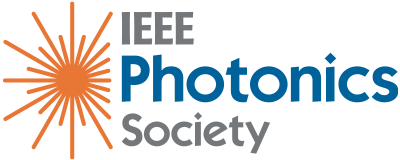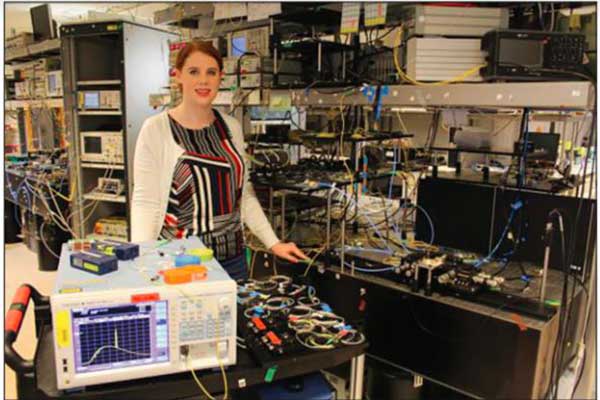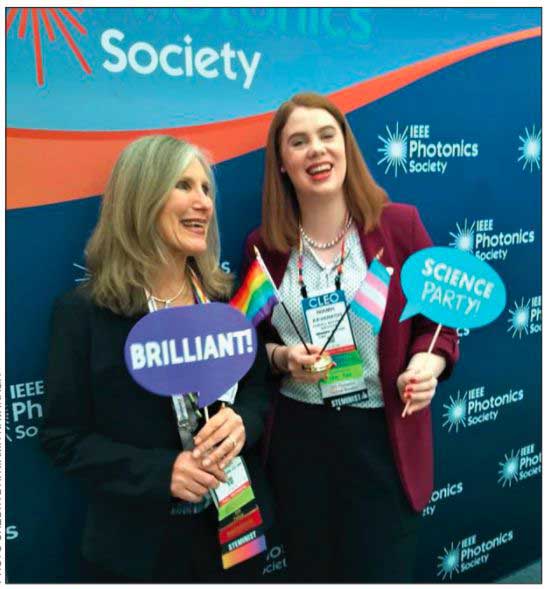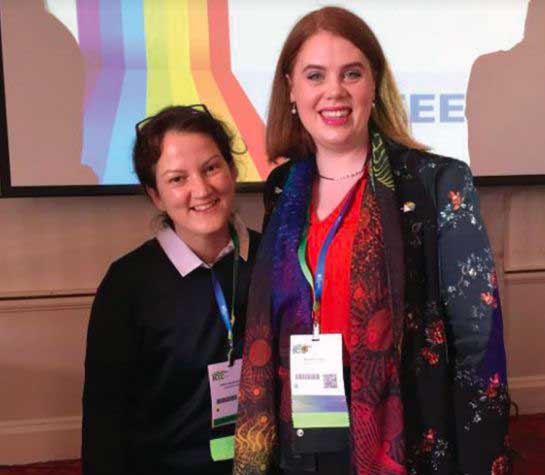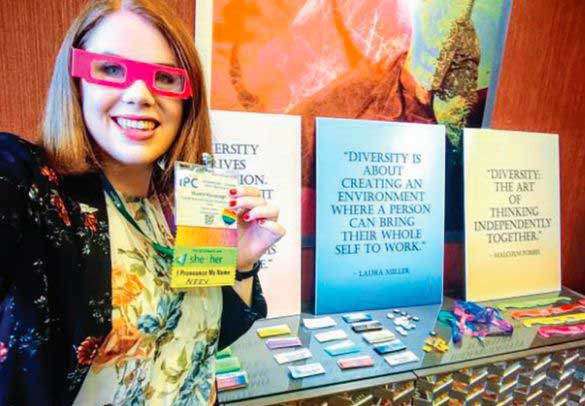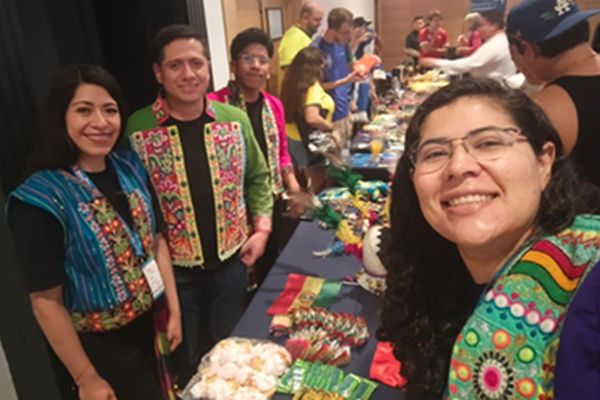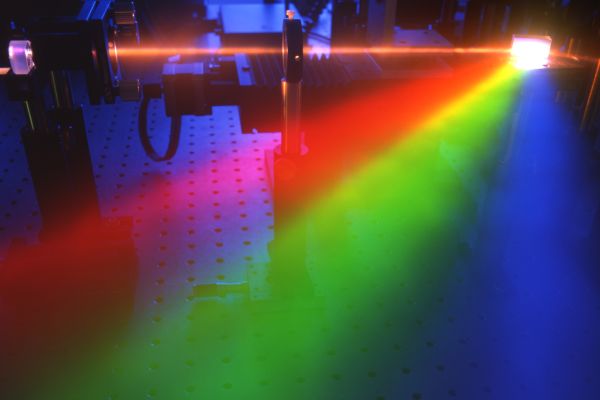By Naznin Akter
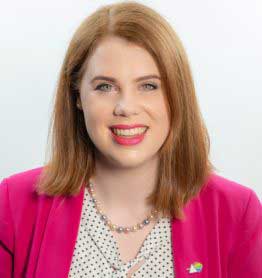
Niamh Kavanagh
Video Product Owner, Verizon Connect
Chair of the Diversity Oversight Committee of IEEE Photonics Society
Our volunteer leaders are the driving force behind the IEEE Photonics Society’s mission. This column commemorates leaders who have made a positive impact on the photonics community around the world. In this issue, Niamh Kavanagh, IEEE Photonics Society Diversity Oversight Committee Chair, is featured.
What is Your Current Professional Job?
I have recently started a new job, working as a video product owner with Verizon Connect (based in Ireland). I work on their core product—Reveal—which tracks vehicle fleets and enables managers to monitor daily operations, reduce costs, increase productivity and stay on top of vehicle maintenance. This incorporates Verizon Connect Integrated Video where the power of HD video, AI and driver-data join forces to proactively mitigate accident risk and encourage safer driving.
What Role Does Your Volunteer Leadership Position Play for IEEE Photonics Society? What Challenges Do You Face?
I have been volunteering with the IEEE Photonics Society in several leadership capacities in the equity, diversity, and inclusion (EDI) sector since 2017. The Diversity Oversight Committee appointed me as chair in 2021. Our committee ensures that all areas of the Society reflect the global diversity of the community it serves. The Society is committed to broadening the range of people and views involved in developing and leading tomorrow’s photonics technology.
As chair, I am responsible for overseeing the development, execution, and analysis of our worldwide EDI strategy and gender diversity, young professionals, and multicultural outreach activities.
What Do You Want to Accomplish as a Volunteer Leader This Year/Next Year?
Some critical elements of our strategy include:
- Implementing the Society’s “Commitment to Diversity”: The IEEE Photonics Society is committed to providing equal opportunity to scientists and engineers, regardless of ethnicity, race, nationality, disability, socioeconomic status, sexual orientation, religion, gender, age, and/or personal identity. Our policy is to continually improve our practices in order to build and maintain an environment that reflects the rich diversity of the photonics and optics scientific community.
- Instilling values of ‘Intersectionality’, such as respecting the voices of those most affected by issues by Centering their voices and respecting their goals for their communities.
- Following a disaggregated data approach to ensure that data collection does not overlook the experiences of individuals with intersectional identities and from marginalized groups.
- Identifying champions to lead the Society forward through our “Change Champion” program. Showcasing volunteers and leaders facilitating positive change and empowering others in the photonics and optics community. Such volunteers advocate for diversity and inclusion; lead altruism projects; organize strategy sessions to implement new ideas; have proven professional development practices, share; etc. The Society provides champions opportunities to attend cross-disciplinary conferences, to spark new ideas, connections, insights to bring back to Society and their scientific work. Change Champions, in turn, become trusted ambassadors, influencers, and organic recruiters, who provide leadership and create new avenues for diverse engagement in the community.
Why Photonics? What was Your “Photonics Moment?”
When I was a teenager, I saw a magical fountain performance that sparked my curiosity in the science of light. As I stood there watching the colorful streams of water meet, I wondered how the light followed the water; wasn’t it meant to move in straight lines? When I chose the topic of light guiding for a research project at university, this curiosity reappeared. Next, what happened led me down the fascinating path of fiber optics and, eventually, to a Ph.D. at the Photonics lab in Tyndall National Institute in Cork. I was profoundly influenced by the feeling of being immersed in research and contributing to cutting-edge and creative technologies that have the potential to impact society positively.
What About Our Society’s Mission and Work That Motivates You?
I want to transform science’s culture to make it more inclusive to everyone who is curious, interested, and committed. I believe that achieving true equity in science should be a top priority, so that everyone, regardless of ethnicity, race, nationality, disability, socioeconomic status, sexual orientation, religion, gender, age, or personal identity, is valued and can reach their full potential in their chosen field.
What Specific Assets Do You Bring to the Table as a Board Member?
I have a reputation for being a communicator, connector, and change-maker within my community. As a communicator, I enjoy making complex concepts discernible, approachable, and memorable and encouraging others to embrace, participate in, and comprehend science and its significance to society and the economy, for which I have received multiple accolades. Apart from that, I enjoy meeting new people, discovering compelling problems, and linking them with unique solutions that result in actual change.
Mention One Thing that You Have Changed and One Thing That You Want to Switch to Improve the IEEE Photonics Society?
I have played a central role in Society’s successful transition to a ‘community model concept.’ We prioritize community impact in our decision-making and use centered leadership methodologies to deliver qualitative and quantitative, measurable benefits. We have witnessed over 16.6% membership increase year-over-year due to opening our community and providing benefits to members above the norm. I have achieved systemic change by influencing key stakeholders, resulting in organizational diversity policies such as codes of conduct and institutional bylaw changes. We want to improve conference accountability procedures to help conference organizers ensure that their events are as inclusive and diverse as possible at all levels.
Can You Name a Person Who Has Had a Tremendous Impact on You as a Leader? Maybe Someone Who Has Been a Mentor to You? Why and How Did This Person Impact Your Life?
Arti Agrawal has had a massive influence on me as a leader. Arti and I met in 2017 at the Photonics Ireland Conference during an IEEE Photonics Diversity & Inclusion discussion. She conducted the panel, and her brilliance, quick wit, subtle tact, and piercing insight wowed me right away. Later in the conference, I sat next to her for the evening dinner. We clicked straight away, and she put me at ease, so I left the conference feeling motivated, invigorated, and more committed to my field.
Arti has had a profound personal impact on me. She has helped me feel less alone, more confident in my advocacy, and more proud to be a Queer woman in Physics. She has provided valuable guidance to me when navigating nuanced situations & has often offered excellent advice about emotive topics. Arti is an inspiration—a visionary leader, a tenacious advocate & an empathetic friend (with the best sense of humor).
What Are the Most Important Decisions You Make as a Leader of the IEEE Photonics Society?
In my role as chair, I have used my communication, collaboration, and relationship management skills to establish, build and sustain effective partnerships with internal allies, external experts, and grassroots community groups throughout the world to enhance the Society’s diversity mission. For example, we have formed strategic sister society relationships with organizations such as the National Society of Black Physicists, Society for Advancement of Chicanos/Hispanics and Native Americans in Science (SACNAS), European Photonics Industry Consortium (EPIC, International Commission for Optics,” and PRISMA, a Spanish organization that supports LGBTQ+ people in STEM.
The most crucial decisions I make are deciding who we should partner with (together with the other committee members and staff liaisons) – what skills and experience are we lacking? From whom can we learn? How can we make sure their input is adequately interpreted and valued?
How Would You Advise Members Who Want to Become More Involved in the Society?
The IEEE Photonics Society offers professional development opportunities to its members, publishes journals, organizes conferences, and supports local chapter and student activities globally. It has various committees and outreach programs that are looking for volunteers. For example, you may serve as a journal reviewer, volunteer for a committee, women in photonics, or a pre-university outreach volunteer. Many ad-hoc volunteer programs with a shorter-term focus are also available.
I would strongly encourage anyone interested in becoming more involved to engage with the Society to find out how you can help and take some time to volunteer. There are many avenues to volunteer and get involved, from micro-volunteering opportunities and beyond. Volunteers with leadership and organizational skills are needed to help impact the organization’s future success.
Why Do You Think Members Should Be Involved as Society Volunteers?
What Are the Benefits? Volunteering allows professional members to create connections with peers with the same technical interests and share information collaboratively. Volunteering also allows students to get involved with new opportunities and develop technical, social, and academic skills that they may not learn in a classroom or lab environment. Volunteering for diversity efforts has allowed me to expand my professional network, feel more at home in STEM, and learn how to advocate for myself more confidently in my career.
What Advice Would You Give Someone Going Into a Leadership Position for the First Time?
Check out a book called: “The Culture Map: Breaking Through the Invisible Boundaries of Global Business” by Erin Meyer. Whether you work in a home office or abroad, success in our ever more globalized and virtual world requires the skills to navigate cultural nuances and decode cultures different from your own.
How Do You Ensure the IEEE Photonics Society and Its Activities Are Aligned With Your Core Values?
I pursued a career in science to follow my curiosity and find a place in life where I could make a meaningful impact.
Essentially, I want to understand how the world works and how I can change it for the better. These are the values on which I want to develop my career and community.
When You Are Faced with Two Equally Qualified Candidates, How Do You Choose Between Them?
I consider who would be a “culture-add” to a team rather than trying to find a “culture fit.”
What is One Characteristic That You Believe Every Leader Should Possess?
Empathy.
What is the Biggest Challenge Facing Leaders Today and What Advice/Suggestion Do You Want to Give Them?
The biggest challenge, in my opinion, is a lack of equity, diversity, and inclusion in the work-place.
Diverse teams produce more excellent results, so it is a solid commercial decision, but inclusion is crucial. In the workplace, diversity is associated with representation. The critical relationships that engage diversity, encourage engagement, stimulate innovation, and contribute to business growth cannot happen without inclusion. Adopting diversity and inclusion principles aids in attracting and retaining the best and brightest individuals. If a business wants to stay competitive in today’s global market, it must recruit and retain people from all demographics. Furthermore, as Apple’s slogan states, “Inclusion inspires innovation”—diverse teams create better products that cater to the diverse consumer market’s demands and interests.
What is One Mistake You Witness Leaders Making More Often Than Others? Do You Have any Advice/Suggestions for Them?
Here are some of the things I wish leaders wouldn’t do so often:
• Stay Silent—Don’t laugh along to bad jokes & then apologize afterward, say something there & then.
• Play Devil’s Advocate—The devil has enough advocates. It is exhausting when your leaders repeat your opponents’ remarks at every turn, even if it’s with the best of intentions.
• Get Defensive—If someone tells you that something that you’ve done as a leader has been problematic or caused them to hurt in some way, try not to get defensive. We all make mistakes & that person is trying to help you learn how you can be a better leader to them.
Do You Have a Favorite IEEE Photonics Society Story?
I often refer to the IEEE Photonics Society as my Photonics family! Indeed, our inaugural Pride in Photonics session at CLEO 2019 is one of my favorite experiences. This initiative aims to recognize the contributions of LGBTQ+ people in STEM fields, provide a forum for open sharing of personal experiences, and encourage acceptance of best practices for inclusion. The initiative’s in-person (and now virtual) events foster cooperation, open conversation, education, networking, and technical dissemination by providing a welcoming environment for LGBTQ+ persons to be their genuine selves in the presence of supporters.
Tell Us Something Fun About Yourself!
I am a professional stilt-walker & have appeared as an extra on stilts in a Bollywood movie!
This column is prepared by Naznin Akter, PMP® (naznin@ieee.org). Any questions or suggestions for the improvement of this column are highly appreciated.
